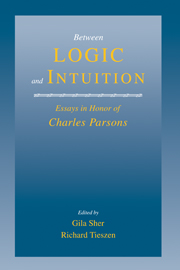Book contents
- Frontmatter
- Contents
- Preface
- I LOGIC
- Paradox Revisited I: Truth
- Paradox Revisited II: Sets – A Case of All or None?
- Truthlike and Truthful Operators
- ‘Everything’
- On Second-Order Logic and Natural Language
- The Logical Roots of Indeterminacy
- The Logic of Full Belief
- II INTUITION
- III NUMBERS, SETS AND CLASSES
- Name Index
Paradox Revisited II: Sets – A Case of All or None?
Published online by Cambridge University Press: 02 December 2009
- Frontmatter
- Contents
- Preface
- I LOGIC
- Paradox Revisited I: Truth
- Paradox Revisited II: Sets – A Case of All or None?
- Truthlike and Truthful Operators
- ‘Everything’
- On Second-Order Logic and Natural Language
- The Logical Roots of Indeterminacy
- The Logic of Full Belief
- II INTUITION
- III NUMBERS, SETS AND CLASSES
- Name Index
Summary
Through the years, I have noticed that set theorists tend to be either strong platonists or strong formalists (although my impression is that the formalists are in the minority). I have also observed that set theorists of both persuasions are quite sure that there are no problems remaining to be thought through! Nevertheless, some philosophers continue to seek an alternative to both formalism and platonism, and I know many mathematicians (and even an occasional set theorist) who are dissatisfied with extremes.
In this essay, I propose such an alternative; in addition, I present a reaction to two of Gödel's papers and to some of Quine's highly influential doctrines, and I have to begin by saying what these are about if my reader and I are to be on the same wavelength.
The aspect of Gödel's views that concerns me is the attitude expressed toward the paradoxes in those papers. Gödel suggests that the paradoxes of set theory arise from a confusion of two ideas, a logical one (or, as I shall say, an intensional one), “extension of concepts,” and another (“set of”) that forms the basis of the cumulative hierarchy. He seems to have felt that we do not yet have a completely satisfactory view with respect to the intensional paradoxes (i.e., the Liar paradox, and the other semantical paradoxes), but that we do now have a clear and satisfactory view of the nature of sets, and not just a way of pushing paradoxes such as Russell's out of the formal language.
- Type
- Chapter
- Information
- Between Logic and IntuitionEssays in Honor of Charles Parsons, pp. 16 - 26Publisher: Cambridge University PressPrint publication year: 2000
- 3
- Cited by



